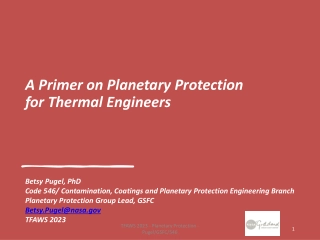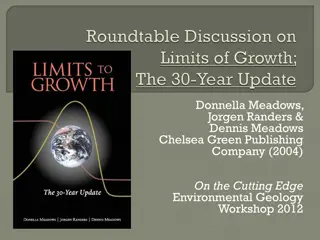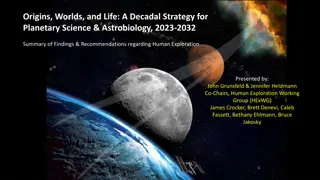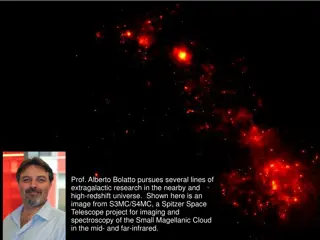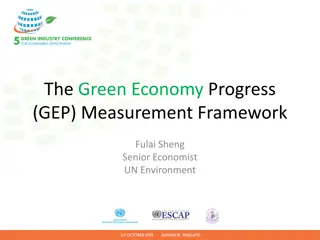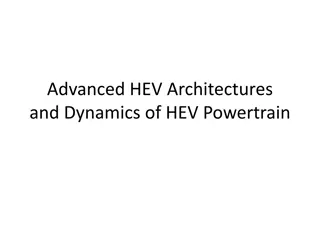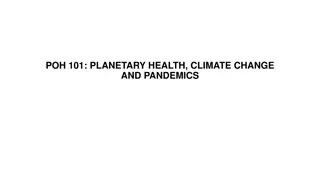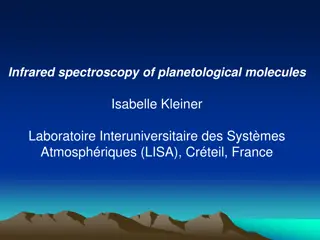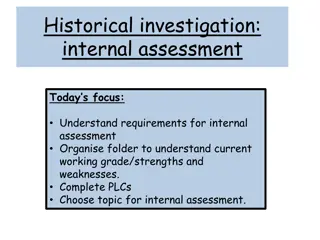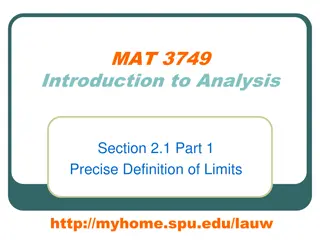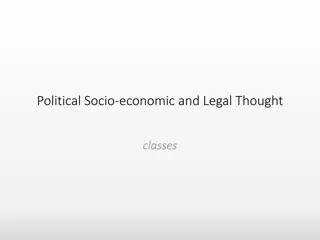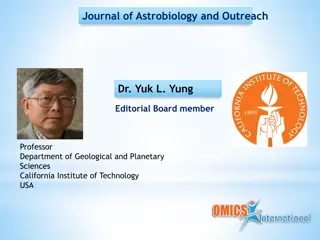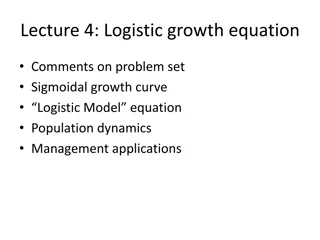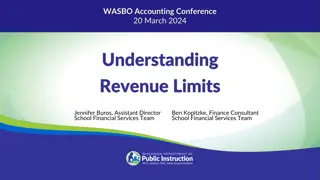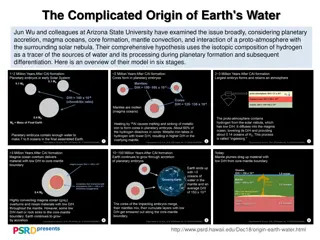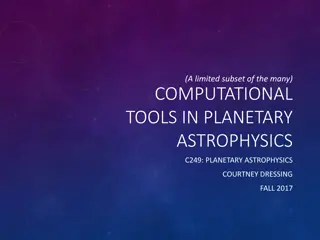Limits to Economic Growth and Planetary Sustainability: A Thought-Provoking Investigation
Exploring the concept of limits to economic growth and the Earth's capacity to withstand human impact, the documentary "Planet of the Humans" sheds light on key ecological economics propositions. It delves into the tensions between capitalist profit-seeking and environmental sustainability, highlighting the urgency of reevaluating our consumption patterns. The film underscores the critical need to shift towards a more sustainable and balanced way of living in harmony with our planet's finite resources.
Download Presentation

Please find below an Image/Link to download the presentation.
The content on the website is provided AS IS for your information and personal use only. It may not be sold, licensed, or shared on other websites without obtaining consent from the author.If you encounter any issues during the download, it is possible that the publisher has removed the file from their server.
You are allowed to download the files provided on this website for personal or commercial use, subject to the condition that they are used lawfully. All files are the property of their respective owners.
The content on the website is provided AS IS for your information and personal use only. It may not be sold, licensed, or shared on other websites without obtaining consent from the author.
E N D
Presentation Transcript
Slideshow: Are there limits to economic growth? Are we reaching the planet s ability to tolerate us? Provided as open source material for teachers and parents by political economist John Hardesty, Ph.D. Film Background Lecture & Discussion Planet of the Humans (2020) For teachers, parents & students
PLANET OF THE HUMANS (2020, dir. by Jeff Gibbs) is based on three propositions of ecological economics: (1) Our solitary planet has finite resources and cannot tolerate economic growth forever; (2) Our profit-seeking capitalist system requires economic growth at both micro and macro levels; (3) We have made no significant environmental progress to date and surged past planetary boundaries 40 years ago.
Eco-footprint < or = 1.0 We only have ONE PLANET. We MUST learn to live more simply/humanly in line with what the earth provides
1980: the year we began living dangerously
The Capitalist System Capitalism is an economic system Its fundamental institutional basis is private ownership of the means of production and distribution (factories, mines, utilities, retail stores, oil wells, refineries, etc., etc., [referred to as capital ]) Thus, the essence of capitalism is that some people are owners (capitalist 1%) who control and the remaining 99% work and take orders to survive.
Capitalism is necessarily unequal and hierarchically structured Capital owners and their top executives (the 1%) have huge incomes and 40% of the wealth. These incomes come from profits and corporate stock ownership (i.e., they do not have to work) The 99 percent who must work for a living have far less income and wealth. Those near the bottom of the income and wealth hierarchy (due to low wages, disability, racism ) then become officially recognized as the poor, (e.g., < or = $26,200 family of 4)
Systems have rules and institutional structures Great majority of U.S. capital (means of production and distribution) is owned by publicly-traded, privately owned corporations Publicly-traded corporations are owned by shareholders (stockholders) who buy shares on the stock market (e.g., NYSE) Corporate CEOs, CFOs, and board members have a legal duty to maximize shareholder wealth (stock prices and annual corporate dividends)
Maximize shareholder wealth which is done by: On the micro-level, a corporation must: (1) reducing product costs (wages/unit) and (2) Seeking the highest market price, and (3) Increasing product sales
The private firm that fails to maximize profitsby reducing costs and selling more goods loses out in market competition to firms that succeed. This is achieved by profit- maximization Then a large portion of profits made in one year must be sunk back into expanding the business so that more goods can be sold next year.
These are called recessions or depressions. On the macro-level, a capitalist economy that fails to grow experiences job loss and unemployment In 2020 the covid-19 pandemic is causing a recession worldwide expected to be worse than the 2008-2009 Great Recession. But while this is very bad for people, it is very good for the planet: pollution and carbon emissions are down.
Hypothetical Roger Smith, from the documentary CEO of General Motors Roger and Me (dir. by Michael Moore, 1989) 1981-1990 Understands the company can make greater profits by moving Flint, MI assembly plants to Mexico where wages and environmental regulations are lower BUT refuses to move because of the harm it would do to the tens of thousands of Flint employees and to city of Flint, MI
1. Legally: Smith is personally liable to a shareholders lawsuit for failing to maximize shareholder wealth 2. Economically: GM will lose ground (market share) to other car corporations that do move their plants to low wage countries and can sell cars at lower prices than GM What happens then? Meaning: Capitalism is NOT a group of individual men & women who do good or bad things but a system of institutions with rules, regulations, and requirements
Since the Great Depression For the past 88 years, the federal government has realized its responsibility to keep the economy growing at any cost. Without government intervention economic crises would be frequent and devastating. Thus, both economic and political requirements dictate unquestioned and perpetual economic growth under capitalism.
The Coronavirus Lessons The vast human global economy has been laid low by a tiny simple creature. There are no technical fixes, because there are millions of viral strains, many of which are likely to be deadly to humans. As the global economy dialed back, nature responded.
This pandemic and most other new, dangerous viruses Are caused by human economic expansion that brings close contact with (1) wild animals or (2) factory chicken, duck, pig or cattle farms And are spread rapidly throughout the human world by global economic activity (air travel, global shipping )
Climate change/crisis (by emitting CO2, methane, etc.) Human economic expansion also causes: Declining ocean viability Mass extinction of non-human species
A key way to sum up this point is By using human Ecological Footprint analysis This is a scientific measure of the earth s ecological resources used by humans 1980: 1.0 planets 2019: 1.75 planets That means we are far past what this earth can provide, and we would have to have another earth-like planet in order to live sustainably, And, even with a second planet, we would still have to STOP growing economically!
The Awful Truth Begin with a global ecological footprint = 1.75 To reduce that to 1.0 Means (approx.) -43% global GDP* i.e., negative growth!!! (aka degrowth ) During the 2020 pandemic we DO have negative economic growth. o But under capitalism humans suffer o And the poor and oppressed suffer most o Both within and between nations *Note: an approximate, suggestive number
The global impact of nations (eco-footprint) varies dramatically
Assume GWP (Gross World Product) = $100 trillion To live at 1.0 planets GWP = $57 trillion A Stable and But what about poor countries in Africa, Asia, Latin America? o For example, Burundi has per capita GDP = $744 (compare USA = $60,000+) Sustainable World Requires Massive Sharing of Resources Can we ask poor countries to cut their per capita GDP by 43%? Or, at all? What is REQUIRED? o Can RICH COUNTRIES move from exploitation to sharing? o Must THOSE wealthy nations reduce beyond 43%?
This is a process called Aims to re-politicize environmentalism by ecologizing society and discarding green growth notions degrowth Rejects all energy systems based on increasingly sophisticated technological organizations managed by bureaucrats and technocrats that Not just because they pollute But they become decreasingly democratic and egalitarian over time And this includes not only fossil fuelsbut nuclear, big hydro, big wind, concentrated solar, etc.
Degrowth... Evaluates the economy in terms of how it uses its economic surplus Ancient Egypt built the pyramids. Feudal Europe built the cathedrals (and crusades). Modern capitalism builds more unnecessary economic growth (and militaries).
Advocates not only using the economic surplus to downsize Degrowth but, importantly, to reorganize society to emphasize: oCaring oSharing oMore labor-intensity of work oCooperation (worker control, consumer control)
These features could mean under the slogan Redistribution not Growth such changes as, for example: Housing cooperatives Local food growing Urban gardens housing for all Communal kitchens Decentralized renewable energy Communal clinics--health care for all food for all Guaranteed basic income for all Shorter workweeks Job guarantees
These new ways of life could be implemented as a process of adaptation to the stagnation of the economy as it fights against planetary boundaries. If, that is, people fight back and refuse to return to the deadly normal that got us here.
Transitioning away from a capitalist economic system that requires growth Degrowth necessarily means And, transitioning toward a localized, democratic socialism By, for, and of the people
NO corporate class inequality and power NO wealthy shareholders to be fed and obeyed NO capitalist ruling class/deep state/power elite How would democratic socialism differ? NO corporate profit maximization requirement Which means we could stop endless GDP growth And provide meaningful sustainable work, incomes, homes, health care for all
In terms of avoiding climate catastrophe, one study calculates: Every person in the world must limit their CO2 emissions to 2.7 tons per year from now to 2050 in order to keep the global temperature rise under 2 deg. C.
An individual exhausts 2.7 tons of CO2: (a) by one round-trip flight SF to NYC, OR (b) by maintaining a typical single-family American home for one month OR (c) by six months (average) driving in USA Dale Jamieson, Reason in a Dark Time (2014) [Prof. Environmental Studies & Philosophy, NYU] Jamieson concludes: by this standard virtually all Americans are human rights violators. (As are most of people in the rest of the world who live similar lifestyles.)
ASK: Working people did not create the mass consumer lifestyle/system Do you feel like a human rights violator? Who destroyed the U.S. streetcar system and got us hooked on the internal combustion engine? Who created the suburbanization of America? Who advertised this lifestyle globally? Who destroyed all the movements for alternative ways of living like democratic socialism?
We had some sustainable ways of living that capitalism destroyed GRAZING FARM ANIMALS FAMILY FARMS STREETCARS CABLE CARS
Brand new cable car No. 9 awaits another trip from Bay and Taylor Streets to Powell and Market. The cables used for this trip would be powered by steam power. SF 1873, 26 lines
What is missing in this discussion? The consideration of who has the power in our country and who does not Critique of the claim we are all human rights violators The controlling role of the capitalist system The systems of politics and economics that developed historically and took us to this place
Discussion (or essay prompts) o IF the only way civilization or, worse, even our species, makes it much past year 2100 is if we learn to share planetary resources more or less equally What would you immediately focus on as a citizen to start this process of change? Explain. Explain what you think must come first, political or economic change.
Discuss What would you tell the U.S. president elect to do in his first 100 days in office in 2021?
Discuss If economic surplus is the extra production above what it takes to provide for the basic needs of all the people, name three categories of our surplus you would reduce/eliminate first (e.g., advertising?). Why start with these categories?
Discuss Is it the responsibility of the individual to change their habits and way of life, or is it the responsibility of society? Explain. For societal-level change to occur, what works best? Top-down forces (like through electoral politics and getting the right person in office)? Bottom-up forces like grassroots organizing (protests, direct actions, etc.)? Some combination?
Discuss In terms of sharing resources with the world s less privileged, how and where do we (in particular, wealthier countries like the United States) start? Is there anything we should stop doing internationally? Anything we should start do internationally?
Discuss o How can we make life within wealthier countries like the United States more equitable? o What programs do we need? o What should we stop doing?
Discuss Brainstorm a list (then discuss) 5-10 things most people accept unquestioningly that would have to change drastically to live with an ecological footprint of < 1.0 planet.
Discuss What will our nation be like-- What will our world be like-- If we are able to achieve an ecological footprint < or = 1.0? Because, there is ONLY ONE EARTH
Concluding comment If economic growth is killing our planet, then don t we need to So, as Michelle Alexander and others have said, (1) JUST STOP IT and It is (2) share the earth s resources equitably? All of Us or None.
References Planet of the Humans (2020) Film Discussion Guide open-source material (free to download) for teachers and students, provided by Rumble Media. Watch film HERE. Articles Philip Alston, United Nations Special Rapporteur, Report of the Special Rapporteur on extreme poverty and human rights on his mission to the United States (June 2018) and Statement on Visit to the USA by Professor Philip Alston UN Special Rapporteur on extreme poverty and human rights (Dec. 15, 2017) Books Harrison Brown, The Challenge of Man s Future (1954) Barry Commoner, The Closing Circle (1971) Kenneth Boulding, The Economics of the Coming Spaceship Earth, in Environmental Quality in a Growing Economy (Henry Jarrett (ed.) 1966) This essay with its vivid metaphors of the cowboy and spaceman economies, can be credited with energizing the field of environmental economics in the late 1960s. Boulding described the open economy of the past with its seemingly unlimited resources and contrasted it with the closed economy of the future. He wrote, I am tempted to call the open economy the "cowboy economy," the cowboy being symbolic of the illimitable plains and also associated with reckless, exploitative, romantic, and violent behavior, which is characteristic of open societies. The closed economy of the future might similarly be called the "spaceman" economy, in which the earth has become a single spaceship, without unlimited reservoirs of anything, either for extraction or for pollution, and in which, therefore, man must find his place in a cyclical ecological system which is capable of continuous reproduction of material form even though it cannot escape having inputs of energy (Boulding 1966: 9). Herman Daly, Steady-State Economics (1977) Charles A.S. Hall & Kent Klitgaard, Energy and the Wealth of Nations (2nd. ed. 2018) Richard Heinberg, Peak Everything: Waking up to the Century of Declines (2007) Richard Heinberg, The End of Growth (2011) Warren Johnson & John Hardesty, Economic Growth vs. the Environment (1971) Giorgos Kallis, In Defense of Degrowth (2017) John Hardesty, Norris, C. Clement, & Clinton E. Jencks, The Political Economy of Environmental Destruction, Review of Radical Political Economics (1971) Donella H. Meadows, Dennis L. Meadows, Jorgen Randers, & William W. Behrens III, The Limits to Growth (1972) Giorgos Kallis, In Defense of Degrowth, Ecological Economics (2011) Donnella H. Meadows, Dennis L. Meadows, & Jorgen Randers, Beyond the Limits: Confronting Global Collapse, Envisioning a Sustainable Future (1992) Giorgos Kallis, Socialism Without Growth, Capitalism, Nature, Socialism (2019) Donella Meadows, Jorgen Randers, and Dennis Meadows, Limits to Growth: The 30-Year Update (2004) E.F. Schumacher, Small is Beautiful: Economics as if People Mattered (1973)
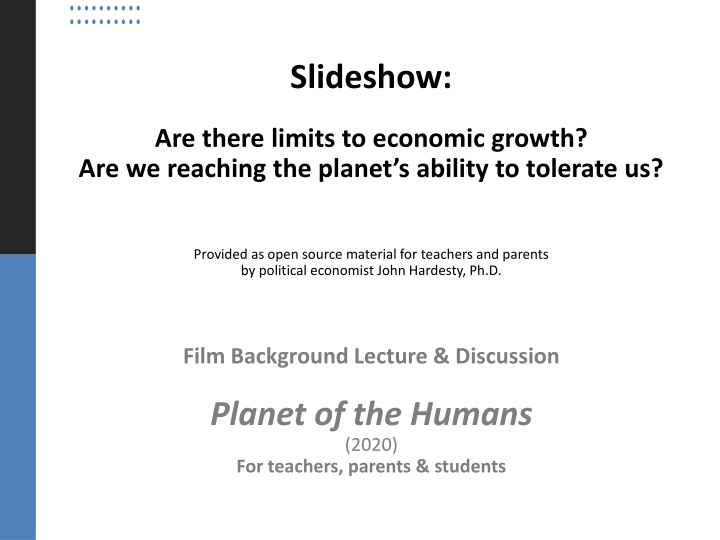

![❤[PDF]⚡ Planetary Ring Systems (Springer Praxis Books)](/thumb/21506/pdf-planetary-ring-systems-springer-praxis-books.jpg)
